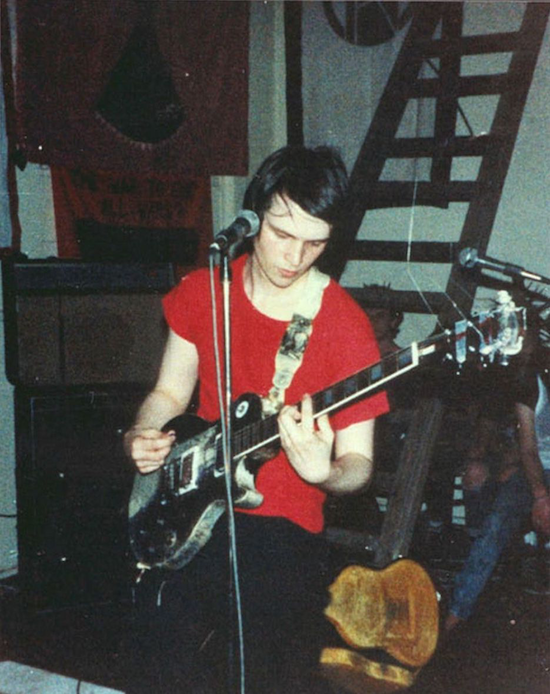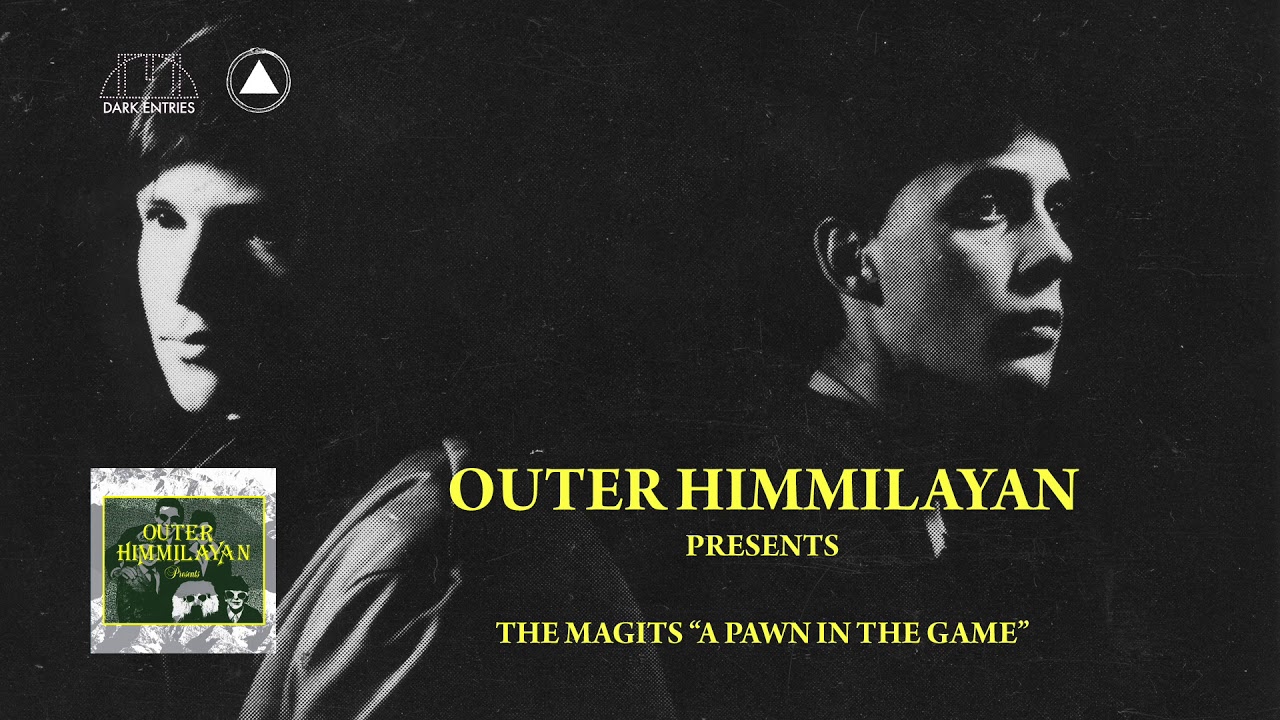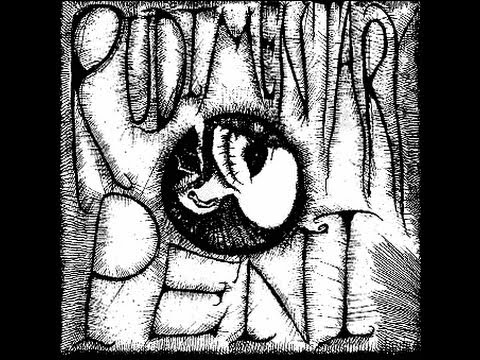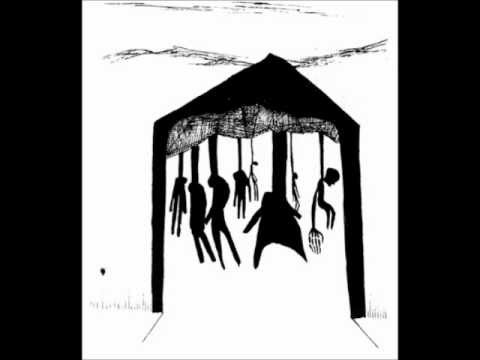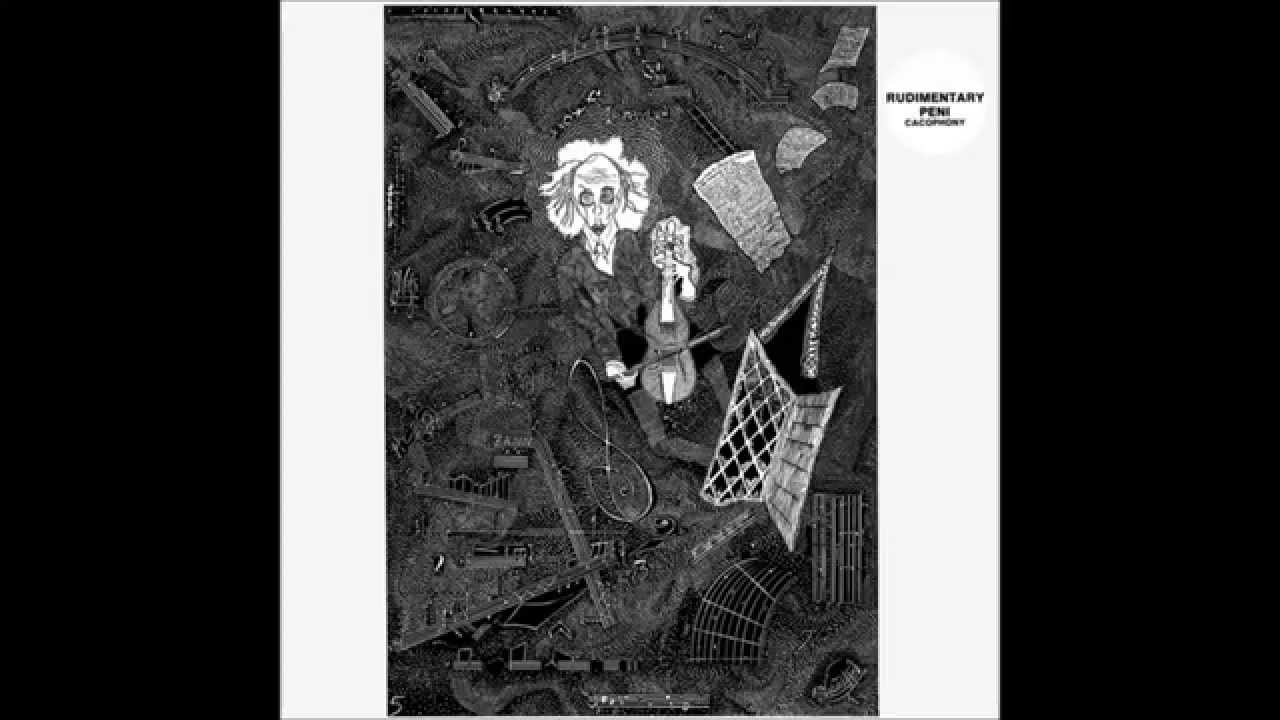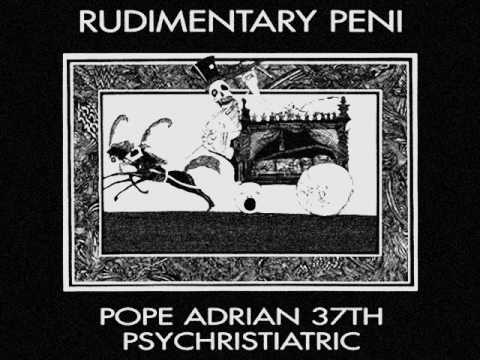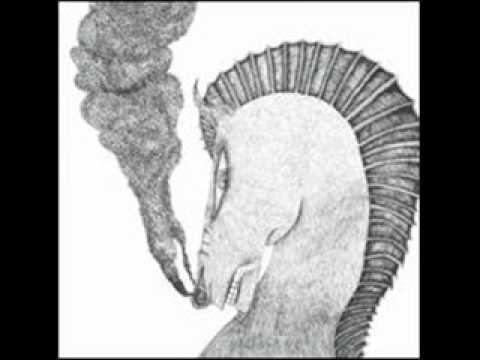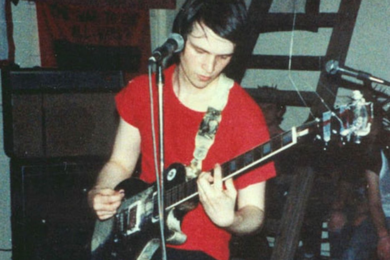An all too rare photograph of Nick Blinko playing live with Rudimentary Peni
Rarely can this long-running series be more appropriately named than when considering the curious case of Rudimentary Peni, a transcendent punk band from England. Notionally part of a subculture which – to generalise – favours extroverts, clarity of messaging and maximum communication between artist and audience, the three-piece, who formed in 1980, had limited patience for how they saw that manifest. After 1983’s Death Church LP, which remains their biggest selling release, they retreated further from ‘the scene’ and into a singular, insular, extraordinary place.
There were extenuating circumstances to account for here. Grant Matthews, Rudimentary Peni’s bassist and main lyricist on earlier records, was treated for cancer during the mid-1980s; when he recovered, the group recorded Cacophony, a dense, wildly ambitious album on a prevailing Lovecraftian theme. The seven-year stretch until their next release is subject to a degree of conjecture, but at some point Nick Blinko – guitarist, vocalist and eventual sole wordsmith – was sectioned, diagnosed with schizoaffective disorder, and parlayed his delusional experiences into the third Peni album, Pope Adrian 37th Psychristiatric. You’ve never heard a record like the result – or your money back.
Blinko, graced with a real name that sounds like a punk pseudonym, has from one perspective become a kind of avatar for Rudimentary Peni (who are completed by drummer Jon Greville); from another, thriving outside of that context. This is on account of his forays into visual art and, to a lesser extent, literature, but neither perspective really holds the key. The recesses of Blinko’s mind which feed his almost superhumanly detailed monochrome illustrations feel inseparable from those which emerge in his music: a Peni release with its cover done by someone else is quite unthinkable. The Primal Screamer, a novel by Blinko first published in 1995, is inspired by the band’s early years as well as the author’s travails with mental health treatment.
The appeal of Rudimentary Peni is wide if diffuse, and seems to have scarcely dipped over four decades, even during extended bouts of absence. Their influence, too, runs deep yet murky. One occasionally comes across apparent imitations in the wild, but the legacy they’ve passed down is perhaps more acutely detected in their immense, immersive aesthetic and an enduring refusal to put themselves through practices they deem dull or uncomfortable. At best indifferent to live gigs, certainly while 1980s anarcho punk peers Crass’ road warrior tendencies were being held up as a model to follow, a tentative return to stages in the early 90s) proved shortlived. Latterly, label promo for the trio’s new album Great War came with a preemptive note that there would be no accompanying interviews (Peni, or individual members, have granted these on occasion but made their disdain clear very early on).
That Great War incorporates each of Rudimentary Peni’s major musical modes is unlikely to be a calculated move. It’s invigorating, though, to hear their macabre gothic clang and frantic bursts of hardcore-esque speed once again, as well as their more median-paced powerchord side, which has come to the fore since 1998 EP Echoes Of Anguish. Although it’s the band’s first set of new material since 2008, the recording is in fact several years old at this point, which if nothing else reduces the temptation of glib observations equating age and energy (Blinko turns 60 later this year). Sealed Records, a sublabel of La Vida Es Un Mus, are releasing Great War and will follow it, over 2021 and 22, by reissuing the entire Peni back catalogue, which was mostly released through the Southern distribution network and has thus been out of print since that folded.
Magits – ‘A Pawn In The Game’ from Another Bouquet On The Grave Of Free Enterprise (1982) & Outer Himmilayan Presents (2018)
Rudimentary Peni were a London band, functionally speaking, but their first musical scratchings happened in Hertfordshire, just north of the capital. Nick Blinko and Jon Greville comprised half of The Magits, a synth-based schoolboy quartet snipped down to a duo of Blinko and Martin Cooper by 1979, the year of their self-released 7-inch. The music of Fully Coherent is anything but, fractional blips of DIY primitivism with no clear structure, but its humour is dry and dark. One more song, ‘A Pawn In The Game’, ended up compiled on one of the hundreds of UKDIY tapes of the era, courtesy of a label called Dead Hedgehog Enterprises (most UK cassette labels were called things like Dead Hedgehog Enterprises). Substantially longer than the whole EP at a little under six minutes, it’s dirgey, surrealist rock collage ending with a yelled plea that Margaret Thatcher “LEAVE MY BODY ALONE!”
The five surviving Magits songs form part of an LP, Outer Himmilayan Presents: co-released by US indies Sacred Bones and Dark Entries, it compiles the earliest product of a label which would later correct its misspelling (to Outer Himalayan) and be reserved for Peni material exclusively. Soft Drinks also featured Greville, while Blinko played in Watford’s S-Haters but left shortly before the first of their two singles on the label.
Rudimentary Peni – Rudimentary Peni (1981)
A lot goes on on the group’s first 7-inch – as well it might, you could say, in relation to the 12 songs therein. Partly, this is because Rudimentary Peni were still establishing what they wanted to sound like. Equally, the EP is prodigiously clever and inventive, much of it likely to show up in any fan’s canon. The transition between ‘The Gardener’ – a mooning gothic rocker where Blinko ostentatiously hisses the S of “thorns” and finishes with a startled yelp – and ‘Teenage Time Killer’, whose creepy slide guitar intro prefaces one of their classic jittery thrashes, is the stuff of lucid dreams. Small, easter egg-like touches beguile, such as the come-and-gone vocal effect on “weaken” in ‘Tower Of Strength’, amidst its oddly romantic procession of beach-bound imagery. There’s something of Wire’s Pink Flag in parts, too: ‘Him Hymn’ splices arch characterisation and intense tempos in the manner of ‘106 Beats That’ or ‘Start To Move’.
Rudimentary Peni – Farce (1982)
Pushead, of Metallica artwork/Thrasher magazine/ Septic Death notoriety, featured the first RP EP prominently in his list of the 100 best 1980s hardcore records (one of those music lists, like the Nurse With Wound one, that’s accrued a sort of mythology). Farce, which followed it, isn’t inherently superior, but does more closely resemble what you might expect a hardcore record to sound like. The band cited North American acts including Gang Green and Neos as influences – both truly obscure to the vast majority of UK punks round this time, I’m pretty certain – which burns through in Blinko’s vocal, barked out with notably added hoarseness, and Greville’s breakneck rolling snare style. Elsewhere, songs like ‘Only Human’ and the dirgey ‘Mice Race’ are a little more militaristically ratatat, closer to strident anarcho punks such as Conflict and Flux Of Pink Indians. Farce, economically filling a single with 10 songs in just shy of 15 minutes, was released on Crass’ eponymous label, so sports the obligatory stencil lettering on the cover (the most anyone’s been permitted to futz with Blinko’s art, as far as I can tell) and typewritten explanations of a few songs. “From Elvis Presley to the Rolling Stones to the Sex Pistols, youth dissatisfaction has been manipulated and exploited,” they say, of the sincerely weird and raging ‘Defined By Age’.
Rudimentary Peni – ‘Rotten To The Core’ from Death Church (1983)
Farce having sold healthily, Rudimentary Peni remained in the Crass orbit for Death Church, their debut album – it was released on Corpus Christi, a sublabel devised for music which didn’t necessarily line up, ideologically, with Penny Rimbaud and the rest of the head office. Notwithstanding that, it features their most scornful and declamatory lyrics. Grant Matthews, the most straightforwardly Political of the trio, stepped away from this role after Death Church, which features broadsides against meat-eating, Catholicism, Britain’s imperial atrocities, the sanctity of marriage – and, in ‘Rotten…’, John Lydon and Joe Strummer’s descent into the corporate rock orthodoxy they once professed to oppose.
As if to underline that he sings as a former true believer, Blinko enunciates with a distinctly Lydonian lilt (“rrrOCK stars”), while the music is Peni at their most unambiguously catchy, closer to The Damned than anarcho punk per se. Thematically, it updates Crass’ own ‘Punk Is Dead’, released four years prior, and both reflective of a strange rock & roll moment in which writing songs about being let down by other musicians was a thing that people did.
Rudimentary Peni – Cacophony (1988)
Speaking in 1992, Nick Blinko described the H.P. Lovecraft fandom as a “kind of cult”, by way of explaining the impulses that made Rudimentary Peni’s second album entirely themed around the writer’s life and works. As such, it would be counterintuitive to try and represent it with any of its 30 songs, although they can certainly be assessed in isolation – as can the skits and interludes between each, one of which is 20 seconds of fart noises. I’m not sure Blinko and Matthews ever got such profoundly pore-opening tones from their respective instruments before or since, ‘The Evil Clergymen’ and ‘Brown Jenkin’ offering gothic noise without parallel. Production-wise, Cacophony is an incredible work which leaves much to be desired: a babel of layered vocals, insectoid buzz and shivery reverb that could venture even closer to its punk-prog zenith with a layer or two of mud hosed off. (Its forthcoming reissue will also be a remaster, pleasingly.) In addition, it serves as a showcase reel for Blinko’s rather impressive range of speaking voices: he could have made a first rate audiobook narrator.
Rudimentary Peni – Pope Adrian 37th Psychristiatric (1995)
Again, this release is most impactful in its entirety, in that the listener can certify – yes, it is all like this. Before the music kicks in on album opener ‘Pogo Pope’, the phrase “Papus Adrianas” is looped four times. Then it continues for the duration of the song, partly drowned out by its punk chunter and Blinko’s vocal, which itself is just him repeating the title until the end. Then the other eleven songs turn out to all have this fucking loop the entire way through, irrespective of what else is happening at any point. I once got sent a Prodigy (from Mobb Deep) advance CD which featured some kind of promo ident overlaid every few seconds, presumably to dissuade people from uploading it but which made it completely unlistenable. Pope Adrian 37th Psychristiatric achieves a similar affect, the difference being this was the idea. Or Nick Blinko’s, at least: as noted previously, this album was both subject to delays because of the frontman’s delusional state and, eventually, inspired by it. Believing himself to have some form of papal authority, the songs riff on this to varying degrees, though often coming off more knowing than delirious (the breezy list of psychiatric medication in ‘Pills, Popes And Potions’). Two more observations that are related, but also not: Steve Albini was on the cards to record this album, or the follow-up to Cacophony leastways, at some early stage, and the album track ‘Hadrianich Relique’ sounds a bit like one of the instrumentals from later Shellac LPs.
Nick Blinko – The Primal Screamer (1995)

Nick Blinko’s debut novel is eminently taggable as ‘cult fiction’, partly for being nigh on impossible to find for some time after its first edition (its current publishers keep it in print more diligently) and partly because it’s as close as we’re likely to come to an official Rudimentary Peni biography. Which is still not that close. The Primal Screamer’s essential conceit is cute: it’s narrated, in personal diary form, by a psychiatrist who takes on a patient, a suicidal teenage boy named Nat. At first monosyllabic and uncooperative, in time Nat develops friendships and takes up music, which is where the notion of Nat-as-Nick becomes more evident. Passing wry comment on the trials of the patient’s (unnamed) punk band – anarchist links, popularity in America – it’s probably wise not to treat it as a faithful recounting of actual events: most obviously, this group’s bassist actually succumbs to his cancer. Conversely, minor asides can still intrigue, such as the therapist – middle-aged and respectable, but with hippy tendencies – listening to the fictive equivalent of the first Peni 7-inch and declaring it reminiscent of Cornelius Cardew.
Rudimentary Peni – ‘In Crematorium Flame’ from Archaic (2004)
Statistics indicate that Rudimentary Peni favour the extended play format above other options: ten or so songs, 20 minutes or less. There’ve been four such releases since 1997 – five including Great War – and they harbour fair portions of midtempo, quasi-metallic punk menace, less of the exhausting idea-blizzards or literal insanity of Cacophony or Pope Adrian. This 63-second denture-rattler from the mid-2000s is a superlative deep cut where everyone involved turns up. Blinko only gives himself three lines to sing, as is common with latterday Peni, but has rarely if ever delivered with that much power; Matthews’ bass buzzes like a nuclear reactor and Greville, who it’s been suggested lost the ability to play the band’s fastest songs, sounds sufficiently vim-full for this one.
Rudimentary Peni – ‘Wilfred Owen The Chances’ (2009/ 2020)
Before Great War, there was this one-track single on a similar theme. Its lyrics are, as per the title, taken from the esteemed WWI poet’s brief oeuvre (as are others on the new album) and set to an unusually slow, leaden rumble, not wholly unlike Death Church’s opening track ‘¼ Dead’ but a sight heavier. Until last year, it was the most actively obscure item in the Rudimentary Peni discography, having scarcely been made available to the public at all: Current 93’s David Tibet, a Blinko acolyte, published the frontman’s second novel The Haunted Head in 2009, with each copy including a CD of the song but less than 500 printed. (I’m aware that might not even sound especially limited, what with book sales being through the floor for some time, but they could have shifted several times that number had they wished.) The Sealed Records one-sided vinyl reissue sounds considerably better, probably due to unsung hero Daniel Husayn mastering it, and is possible to own without spending a questionably large amount of money.
Nick Blinko – Artwork

‘Belle Jar’ by Nick Blinko
It’s not that Nick Blinko’s drawing abilities went unrecognised: the full, 24”-by-36” foldout sleeve of Death Church is about as rad as vinyl packaging gets. It’s more that for a long time only punks and goths knew about it. This changed in 1994 when the National Schizophrenia Fellowship, a UK mental health charity, exhibited some of his work – Blinko’s first brush with the gallery context – opening him up to the more formal and monied side of the visual art world. His place in this touring show from 2004, promoted under the Art Brut banner, was by no means that of an intruding upstart. The first comprehensive assembly of Blinko’s art was published last year by German imprint Zagava. In it, he recounts working on these pieces for 18-hour stretches, pushing through both the physical discomfort and the dangers inherent to skipping his meds (which impede his creativity), and while it would be trite to suggest the viewer can enter into the Blinko mindset, another zone is certainly possible given a few uninterrupted hours and a magnifying glass. The level of detail in his penmanship is jawdropping: most of the original pieces are not significantly larger than depicted in the Zagava book, yet typically one will contain hundreds, often thousands of components, discrete yet forming a nightmarishly surrealist whole.
Great War by Rudimentary Peni is released Fri 23 Apr on Sealed

